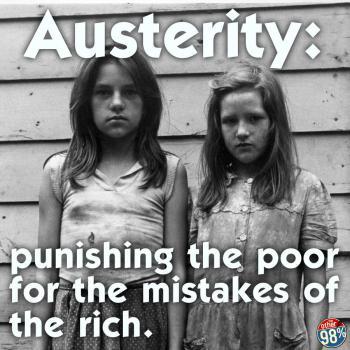[embedded content] We are not going to get out of the present economic doldrums as long as we continue to be obsessed with the insane idea that austerity is the universal medicine. When an economy is already hanging on the ropes, you can’t just cut government spendings.Cutting government expenditures reduces aggregate demand. Lower aggregate demand means lower tax revenues. Lower tax revenues mean increased deficits — and calls for even more austerity. And so on, and so on. To many conservative and neoliberal politicians and economists, there seems to be a spectre haunting the United States and Europe today — Keynesian ideas on governments pursuing policies raising effective demand and supporting employment. And some of the favourite arguments used among these
Topics:
Lars Pålsson Syll considers the following as important: Economics
This could be interesting, too:
Lars Pålsson Syll writes Schuldenbremse bye bye
Lars Pålsson Syll writes What’s wrong with economics — a primer
Lars Pålsson Syll writes Krigskeynesianismens återkomst
Lars Pålsson Syll writes Finding Eigenvalues and Eigenvectors (student stuff)
We are not going to get out of the present economic doldrums as long as we continue to be obsessed with the insane idea that austerity is the universal medicine. When an economy is already hanging on the ropes, you can’t just cut government spendings. Cutting government expenditures reduces aggregate demand. Lower aggregate demand means lower tax revenues. Lower tax revenues mean increased deficits — and calls for even more austerity. And so on, and so on.
Cutting government expenditures reduces aggregate demand. Lower aggregate demand means lower tax revenues. Lower tax revenues mean increased deficits — and calls for even more austerity. And so on, and so on.
To many conservative and neoliberal politicians and economists, there seems to be a spectre haunting the United States and Europe today — Keynesian ideas on governments pursuing policies raising effective demand and supporting employment. And some of the favourite arguments used among these Keynesophobics to fight it are the confidence argument and the doctrine of ‘sound finance.’
Is this witless crusade against economic reason new? Not at all!
Every widening of state activity is looked upon by business with suspicion, but the creation of employment by government spending has a special aspect which makes the opposition particularly intense. Under a laissez-faire system, the level of employment depends to a great extent on the so-called state of confidence. If this deteriorates, private investment declines, which results in a fall of output and employment (both directly and through the secondary effect of the fall in incomes upon consumption and investment). This gives the capitalists a powerful indirect control over government policy: everything which may shake the state of confidence must be carefully avoided because it would cause an economic crisis. But once the government learns the trick of increasing employment by its own purchases, this powerful controlling device loses its effectiveness. Hence budget deficits necessary to carry out government intervention must be regarded as perilous. The social function of the doctrine of ‘sound finance’ is to make the level of employment dependent on the state of confidence.
Michal Kalecki Political aspects of full employment (1943)
